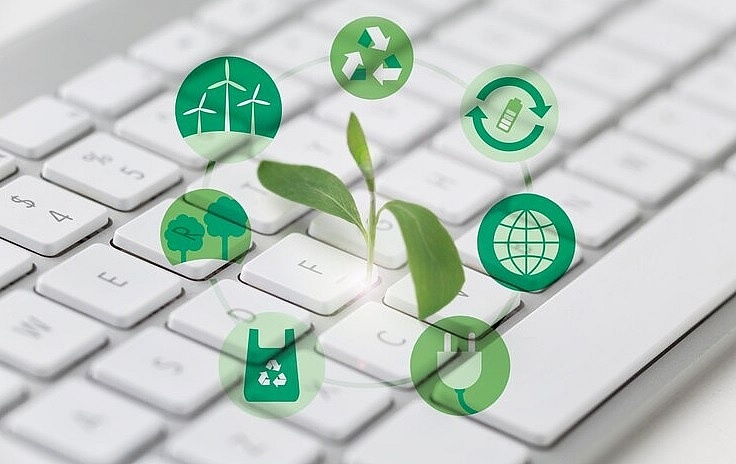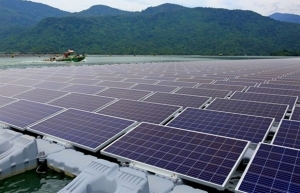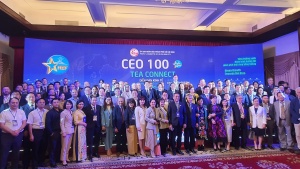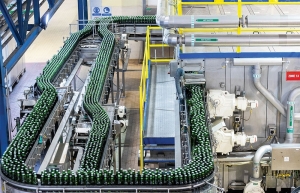Green development the first choice for businesses
 |
| Green development the first choice for businesses, illustration photo/ Source: freepik.com |
After the most difficult year in 30 years for textile and garment exports, according to the Vietnam Textile and Apparel Association, Garco 10 is aiming to accelerate recovery and achieve growth in 2024.
In early January, general director Than Duc Viet said that the company will take advantage of “even the smallest opportunities” from the market, expanding customer numbers to maintain production and business activities.
“We have a plan to transform green production, which started with reducing energy use from 2022. This process is expected to last for many years, but the biggest challenge for us is changing the perception of both management and employees,” Viet said.
Last year, Garco 10’s revenues and profit only reached 91 and 82 per cent, respectively, compared to 2022. This year, the business aims to exceed 6.6 per cent of revenue and 5.7 per cent of profit compared to 2023 by investing more resources in production activities, new product research, and greener production.
Garco 10 is among the top garment and textile enterprises in Vietnam, with about 80 per cent of products serving the export market. Its three main export markets are the United States, Europe and Japan, which all high have demands and strict requirements on partners such as having to participate in green production chains and providing greener products. The enterprise also aims to gradually convert from conventional production activities to fully green production by 2030.
According to Viet, some of Garco 10’s biggest customers such as Zara and H&M all have a strategy to prioritise fashion products using green materials. Meanwhile, other customers from the US and Japan prefer fashion products that are recyclable and made from organic materials.
“If businesses want to survive and develop, they must meet customer requirements,” Viet said. “We are focusing on finding more non-traditional markets such as South Korea, Taiwan, and Canada. Last year, we exported products under orders from markets such as Australia, China, Thailand, and the Philippines.”
Nguyen Quang Vinh, vice chairman of the Vietnam Chamber of Commerce and Industry (VCCI), assessed that the picture of the business community in 2023 was of contrasting colours, with the upstream reflected in the quantity and quality of businesses’ commitment to sustainable development goals.
At the 10th Sustainable Businesses in Vietnam awards organised by the VCCI and the Vietnam Business Council for Sustainable Development at the end of last year, out of nearly 500 business applications registered to participate, nearly 25 per cent were new businesses contributing for the first time.
“More and more Vietnamese businesses realise that sustainable development practices are the best weapon to improve competitiveness in a volatile economic context,” Vinh said.
Dao Thuy Ha, deputy general director of pharma giant Traphaco, agreed that its sustainable development strategy has helped the company build a stable foundation to create momentum for business development.
Traphaco has developed a green value chain from input materials to factories that meet international standards, bringing quality medicinal products at reasonable prices to customers.
“The path of sustainable development has never been smooth,” Ha expressed. “However, we believe that difficulties are only temporary and that businesses can completely overcome them to create more sustainable progress in the coming years, thanks to the support of the community and the encouragement and determination of the government.”
According to a sustainability survey from Schneider Electric for 2023, published in January, 99 per cent of Vietnamese businesses said they have set goals for sustainable development. Almost half of them have or are implementing comprehensive strategies to reach their commitments, but there still exists a gap from aspiration to action.
Dong Mai Lam, general director of Schneider Electric Vietnam and Cambodia, said, “We see a positive increase in awareness and commitment of Vietnamese businesses in setting sustainable goals. Many organisations may be pursuing sustainability, but still lack an overall roadmap and are focusing only on short-term goals.”
Meanwhile, Furusawa Yasuyuki, general director of AEON Vietnam, commented that Vietnamese companies are making greater efforts to build sustainable and effective business models to contribute more value to society.
“Building a sustainable business model requires numerous diverse activities and investing plenty of resources. Therefore, companies of all sizes need to receive support from the government,” Yasuyuki said. “Vietnam is AEON’s second key market after Japan. In the next stage of development, we will accelerate the promotion of sustainable development activities like Cleaning Day, an eco-bag contest, the rent a bag initiative, and make more coordinated efforts with stakeholders to jointly attain this goal, especially promoting sustainable consumption and spreading green lifestyles to customers.”
According to a survey by the Enterprise Development Agency under the Ministry of Planning and Investment, 83 per cent of businesses believe that green production helps improve their image and reputation, and 57 per cent realise the need to convert towards green and sustainable production in order to expand markets and find partners in Europe and the US.
 | Vietnam to introduce criteria for national green development Vietnam is soon to introduce a new set of national criteria aimed specifically at speeding the development of green industries in line with international standards, according to the Ministry of Planning and Investment (MPI). |
 | Foreign community pushes initiatives for Ho Chi Minh City's green development More than 100 CEOs from global corporations gathered on September 14 in Ho Chi Minh City to push forward their initiatives and cement their commitment to collaboration with the city to implement its green development and zero carbon goals. |
 | F&B prioritising green development moves Dedicating more resources to research and development of greener products is being called essential for food and beverage businesses. |
What the stars mean:
★ Poor ★ ★ Promising ★★★ Good ★★★★ Very good ★★★★★ Exceptional
Related Contents
Latest News
More News
- Vietnam, New Zealand seek level-up in ties (February 19, 2026 | 18:06)
- Untapped potential in relations with Indonesia (February 19, 2026 | 17:56)
- German strengths match Vietnamese aspirations (February 19, 2026 | 17:40)
- Kim Long Motor and AOJ Suzhou enter strategic partnership (February 16, 2026 | 13:27)
- Haiphong welcomes long-term Euro investment (February 16, 2026 | 11:31)
- VIFC in Ho Chi Minh City officially launches (February 12, 2026 | 09:00)
- Norfund invests $4 million in Vietnam plastics recycling (February 11, 2026 | 11:51)
- Marico buys 75 per cent of Vietnam skincare startup Skinetiq (February 10, 2026 | 14:44)
- SCIC general director meets with Oman Investment Authority (February 10, 2026 | 14:14)
- G42 and Vietnamese consortium to build national AI infrastructure (February 09, 2026 | 17:32)

 Tag:
Tag:




















 Mobile Version
Mobile Version